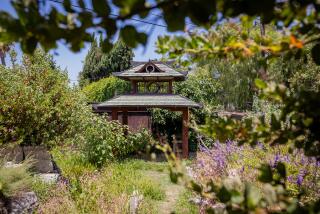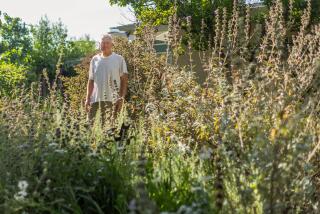Company Finds Itâs Nice to Fool Mother Nature : The Maker of Artificial Products Targets Home Market
Larson Co., a maker of artificial trees, cacti, rocks, coral reefs and whimsical items like the giant frogs at an Irvine shopping center, is looking to spruce up your home, just as it has theme parks, resorts, malls and casinos for 19 years.
The companyâs artisans re-create nature from materials like steel bars, epoxies, liquid latex and polyurethane foam. Larson, based in Tucson, Ariz., recently began offering a line of home products replicating redwood ceiling beams, saguaro cactus-ribbed spas and stone fireplaces.
Homeowners who want âthat special texture, that endangered wood, that rare wood that you canât find anywhere else--weâve got it,â said Harold Schifman, the companyâs president and chief executive officer.
âWhere itâs not popular or politically correct to rape an ocean floor or take a redwood forest out,â he said, âthatâs where we come in.â
Amid increasing concerns about the environment and the damage that harvesting rare woods and other building products can have, Larson figures its faux redwood and other products will appeal to those looking to decorate in an earthy style.
Such artificial home products, however, remain a new and largely untested market and Larson has just begun to sell those goods, mostly to home builders and product manufacturers.
The company employs 300 to work on its various products. Its fabricated trees and rubber vines, painted and textured, have the look and feel of whatâs been replicated.
So do the rock habitats and waterfalls, dolphins and dinosaurs that Larson has built for the entertainment industry.
The company began with fake rock formations, brilliantly colored aquarium seascapes and zoo habitats. It then moved into projects at theme parks and the like: a giant red water pump and wooden bucket at Fievelâs Playland at Universal Studios.
At the Woodbridge Valley Shopping Center in the Irvine subdivision of Woodbridge, the companyâs giant frogs lend a family atmosphere, said Dawn McCormick, spokeswoman for Irvine Co., which owns the center.
âThey are fun and whimsical and sturdy,â McCormick said. âThe kids have a good time playing on them.â
Award-winning golf course designer Tom Fazio also used rock formations created by Larson at the exclusive Pelican Hill Golf Course in Newport Beach. Faux rocks dot the fairways, and fabricated cliffs line the 36-hole course overlooking the ocean.
Andy Banfield, a designer with Fazio Golf Course Designers in Hendersonville, N.C., said the look created by Larson tricks the eye because it blends with the surrounding geography.
At Pelican Hill, for example, Larson replicated Orange Coast cliffs by molding the real cliffs on the shore nearby. Likewise, the rocks around the seventh-hole lake were created by molding rocks in the inland areas near Pelican Hill.
âTheyâre the best thing next to Mother Nature,â said David Rice, director of architecture and planning for the San Diego Zoo. âThe things they do really do fool you.â
Rice said a geological engineer once toured a Larson exhibit at the zoo, then called him âto say how irresponsible it was to have dirt banks that could erode and wash away--and he wasnât more than 10 feet away from concrete pretending to be dirt.â
At its three-building, 12-acre manufacturing site, Larson makes palms and other trees, sells truckloads of artificial boulders to landscape nurseries and even camouflages poles as pine trees for cellular telephone systems.
The companyâs founder, Mervin Larson, a onetime director of the Arizona-Sonora Desert Museum, began puttering with phony rocks more than 30 years ago.
Schifman said Larson realized that animals in more natural settings were healthier and lived longer. âHe also found that people who visited the institution liked it better, and attendance grew,â Schifman said.
Schifman headed a 1987 buyout of the company. Since then, annual sales have grown to more than $20 million, with one-fifth of its business coming from overseas. The privately held firm doesnât release profit figures.
Larson is now studying how best to market its products to homeowners, exploring options including catalogues and home improvement stores. Samples of home products at its factory include back-yard spas with coverings of faux redwood or saguaro ribs.
The fakes are less expensive, when considering installation and labor costs, than the real thing--and theyâre fireproof, Schifman said. They can replace items that are too rare to get from nature.
Half of Larsonâs customers are businesses. Only a few years ago almost 90% of its work was from institutions such as museums.
âWeâre really driven by a concept of providing a solution for the architect or owner, creating this theme environment,â he said.
More to Read
Inside the business of entertainment
The Wide Shot brings you news, analysis and insights on everything from streaming wars to production â and what it all means for the future.
You may occasionally receive promotional content from the Los Angeles Times.










